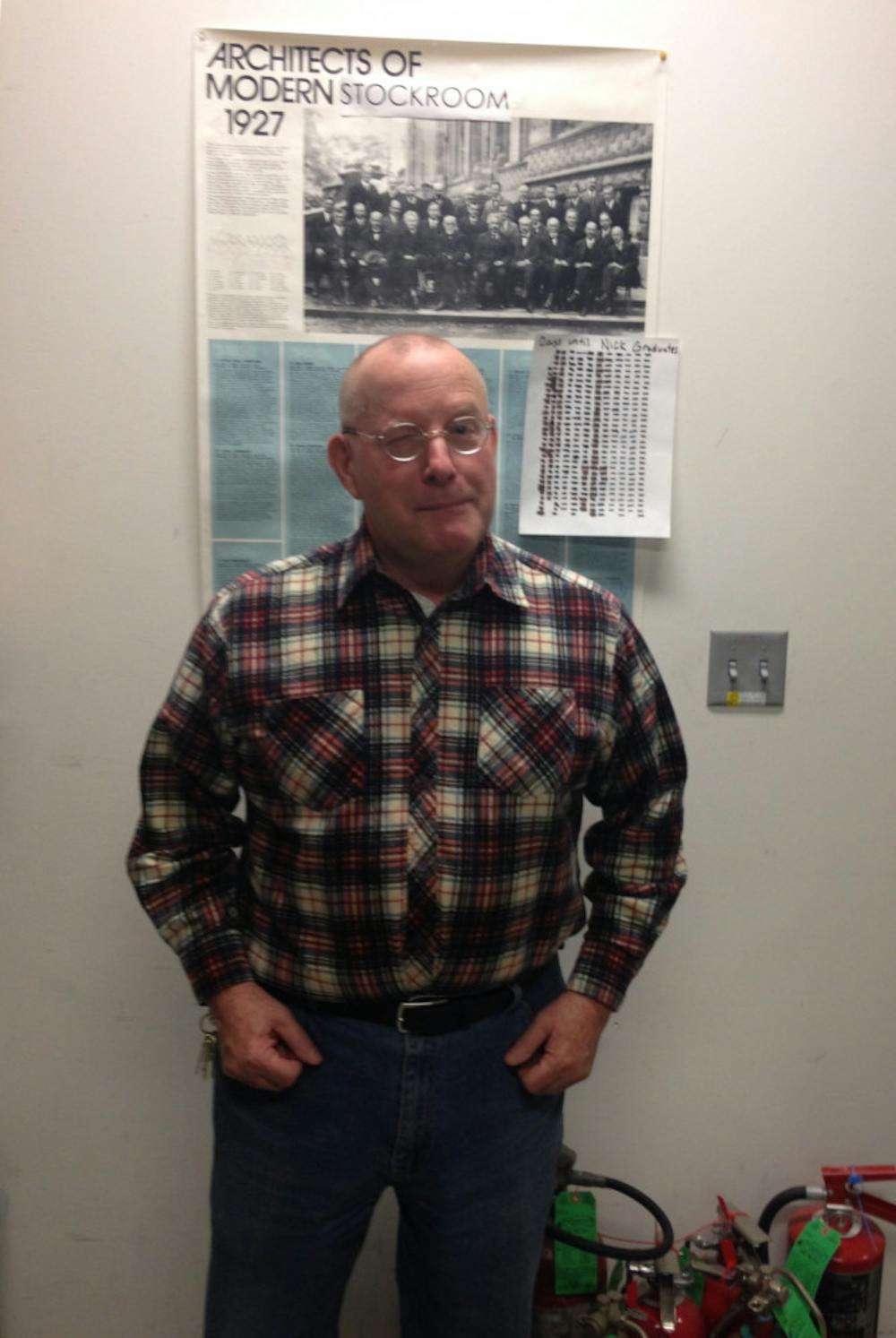When I peered into the stockroom on the first floor of Bi-Hall, Tom Sheluga and his assistant were hunched over a copy of the Middlebury magazine. He ushered me over and gestured at a picture of Roger Sandwick, a biochemistry professor. As I approached, I realized he was actually pointing at the bell on the shelf directly behind the photo. It was labeled as a superintendent’s bell once belonging to Sandwick’s grandfather.
“He says it’s a school bell,” said Sheluga. “But I’m convinced it’s a pirate’s bell, albeit a small pirate… [with] a rowboat type thing. He couldn’t afford anything better!”
You may not have met Mr. Sheluga unless you’ve broken enough glassware in Orgo lab to warrant being sent into the bowels of McCardell Bicentennial Hall in search of new beakers and test tubes. As the College’s laboratory stores manager and the safety director for the building, he is in charge of much more than showing clumsy students where to find replacement glassware. His day-to-day tasks include teaching safety classes, refilling tanks of liquid nitrogen, making deliveries when shipments arrive and greeting people who enter the stockroom in search of various items.
“Occasionally, we have a spill we have to handle. Occasionally, we have hazardous waste we have to take down,” Sheluga said. “[Otherwise] that should be the day unless something happens out of the ordinary.”
And things out of the ordinary certainly have happened while the stockroom has been under Sheluga’s jurisdiction.
He recalled one time, when they had “the explosive stuff,” chemicals disintegrated into what should have been highly explosive material. The college had to hire contractors to come (at 4 a.m.) to remove the chemicals from the stockroom.
Sheluga recalled, “I was so disappointed. The guy [who came to remove the chemicals] came in a pickup truck. We spent $5,000, and he came in a pickup truck. And then he told me I was his backup.”
But all of the concern turned out to be for naught, Sheluga explained.
“We thought we had something that was gonna go kaboomski. We had a little bit left, so we sprinkled it on the lawn and tried to ignite it. It didn’t ignite.”
There was also the mystery of the disappearing bovine kidneys.
“We put them outside, and then something took them. And it took them,” he snapped his fingers suddenly, “like that.”
“Now you know, a kidney, it’s a pretty good size, pretty firm. Something took them to eat them, we presume, although it might have played with them, I don’t know. We never saw those kidneys again. Still looking for ‘em. Now we leave them out there to see if something takes them, and they always disappear. So if you find those in the dining hall…” He winked.
Sheluga has held his position for 16 years, and was there for the science department’s big move to the then newly -constructed Bicentennial Hall.
“When we first set Bi-Hall up, we had to have a trapper in to get all the animals out. It was like an animal sanctuary. Now, of course, we’re just a regular metropolitan area here… a dramatic change from the Spartan days when we had to go to Freeman to go to the bathroom.”
Prior to coming to Middlebury, Sheluga held a position as Exxon Chemical Company’s Environmental Coordinator for the entire Northeast and oversaw the company’s activity in the United States, Latin America, South America, and Asia. But he never expected to have a career in the sciences; in fact, he claimed he “fell into it.”
“For a period, I was interested in girls,” he said frankly.
Sheluga more or less stumbled upon his current job.
“I was working as an attorney for the state of Vermont, and I kind of got disillusioned with the sense of justice. There just didn’t appear to be any. I was doing child support work, when this job came up. I didn’t hear anything [from Middlebury] for 4-5 months, and they called me in for an interview. Then, we were moving from the old science center to this building [Bi-Hall].”
Part of his job, too, is housing some of Bi-Hall’s stranger history. Sheluga directed my attention to two safes sitting on the stockroom floor, which he told me dated back to the 1860s.
“This one over here, which hasn’t been opened until recently, probably ten or fifteen years ago, supposedly has platinum in it. And it has a ball of opium, like the size of a softball.”
He once laid eyes on the opium, which had deteriorated. “I don’t know if that’s good for opium, or bad for opium, but there’s now an oozing black ball.”
Sheluga made sure I heard one last story before I rushed to class upstairs. There was a time when one of his student employees once hosted parties in Bi-Hall. In what was apparently a very lucrative setup, the student hid in the men’s room until the night watchman had left, and then brought in speakers, adult beverages, and charged five bucks a pop.
“Somehow they caught him, and he was never quite sure how they did that,” Sheluga smiled. “But I like the ingenuity.”
Although running the Bi-Hall stockroom involves an interesting and varied list of responsibilities, Sheluga described his job mostly as doing “things nobody else likes to do.”
“If you got a mouse in your room, we’ll come get it. If you’ve got a snake, we’ll come and take him away. If you spill something, we’ll clean it up. And if you’ve got too much trash, we’ll take it away. We’ll do anything you need to have done, as long as it’s not immoral, and I don’t know if anybody else does that,” he said.
Stocks down, but Stockroom Always Up

Comments


